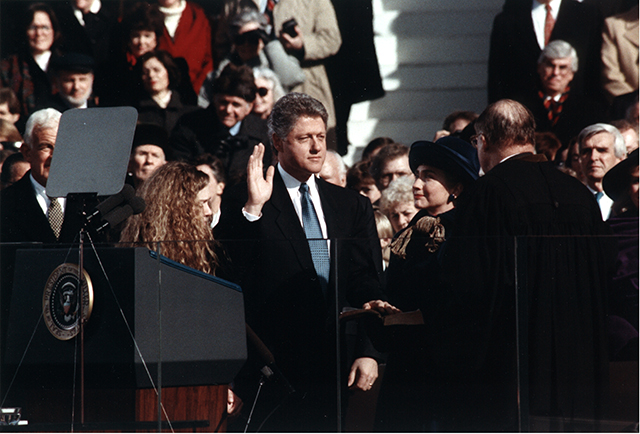1993: Clinton Takes Office, the Web Goes Public, and a Signed Treaty to Reduce Nuclear Warheads

A new president kicked off 1993. Tragedy struck professional tennis. The World Wide Web went public. Abortion protests came under fire. And an agreement was made to reduce nuclear warheads.
Bill Clinton took office as the 42nd President of the United States, beating out the incumbent President George H.W. Bush. Clinton emerged as the popular vote despite Bush’s Cold War and Desert Storm successes and accusations of Clinton dodging the draft and smoking marijuana. According to the CIRP Freshman Survey, following this election year, most students discussed politics either “frequently” (18.8%) or “occasionally” (54.9%). And even though Clinton won the popular vote amidst marijuana use accusations (even though he “did not inhale”), the majority of incoming freshmen did not think that marijuana should be legalized (71.8%).
In sports news, pro tennis player Monica Seles was at the top of her game and coming off of major wins at the French Open, the US Open, and then defeating Steffi Graf at the Australian Open. At a tournament in Hamburg, Germany, just a few months after the Australian Open, Seles was brutally stabbed in the back on the court during a change-over between games by an obsessed fan of Steffi Graf. Seles did not return to professional tennis for two years following the incident. When incoming freshmen were asked about how often they exercised or played sports in the past year, about a third (32.4%) reported they did so 11 or more hours a week and 17.3% reported 6 to 10 hours a week. In addition, 36.5% of incoming college students expected that there was either a “very good chance” or “some chance” that they would play varsity/intercollegiate athletics.
The World Wide Web was placed in the public domain by CERN, with their release of the source code for Tim Berners Lee’s WorldWideWeb software. By the end of the year, there were over 500 known web servers providing internet access. Although only 2.3% of incoming freshmen reported computer programming as their probable career, most students reported using a personal computer within the past year either “frequently” (37.8%) or “occasionally” (43.5%).
In Florida, an abortion protest turned fatal when a doctor was tragically shot to death outside his abortion clinic. Abortion was, and continues to be, a hotly debated issue across the country and CIRP asked students about their opinions on the matter. Most students believed that abortion should be legalized (62.4%). Women however were more likely to believe that abortion should be legal with 39.1% of women compared to 31.8% of men “agreeing strongly” on the issue.
In an effort to continue peace efforts in the post-Cold War era, the Strategic Arms Reduction Treaty (START II) was signed between the U.S. and Russia. As part of this treaty, both the U.S. and Russia agreed to reduce their nuclear warheads. Among the several political questions on the CIRP Freshmen survey, incoming college students were asked whether or not they believed nuclear disarmament was in fact attainable. With this treaty in place, most students agreed that nuclear disarmament was attainable, with 17.8% “agreeing strongly” and 46.4% “agreeing somewhat.”
Did you know? 78.5% of incoming freshmen “frequently” or “occasionally” studied in a library.
20.1% of incoming students “frequently” and 66.1% “occasionally” discussed ‘safe sex.’
23.2% of incoming college students “frequently” felt overwhelmed by all they had to do.
